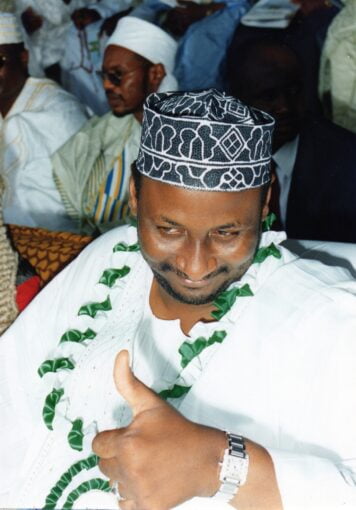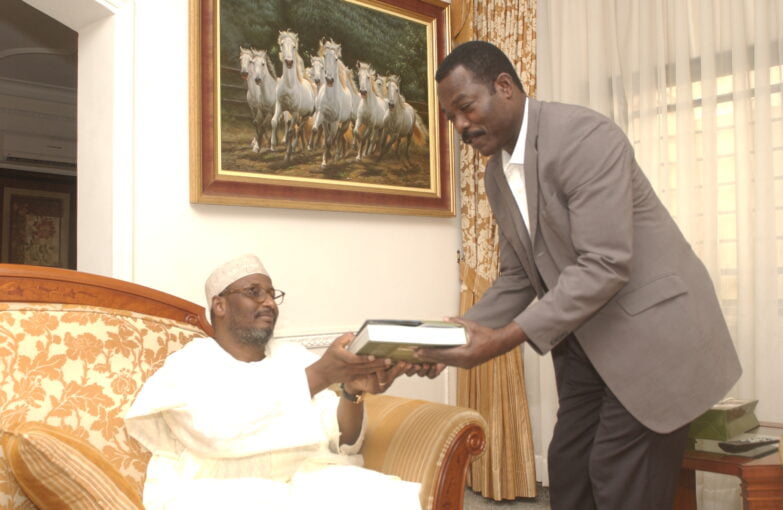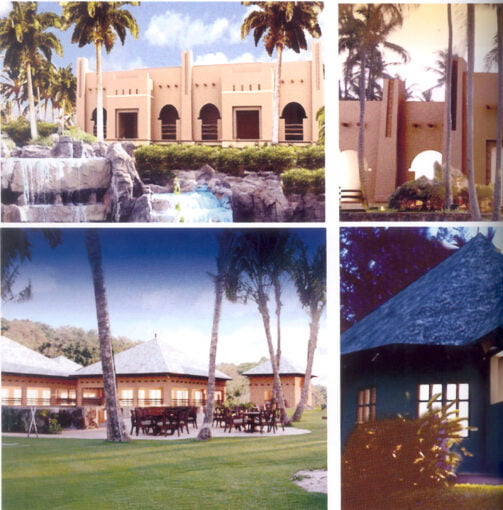Black achiever Alhaji Ahmadu A. Mu’azu, Former Bauchi State Governor

BY SOUMANOU SALIFOU
After Alhaji Ahmadu Adamu Mu’azu took the oath of office as the 13th governor of Bauchi State exactly at 12:20 p.m. on the bright sunny day of Sunday, May 30th, 1999, we wrote in this magazine that “throughout the inaugural ceremony, the big clock at the stadium was frozen (certainly unintentionally) at the hour of 12. One could read that as 12 midnight, the beginning of a new day, or 12 noon, the peak of Bauchi’s resolve to blaze new paths for development.” On hindsight, exactly 13 and a half years later today, it is fair to say that both readings of the time were right. The young governor – then only 44 – ushered in a new era that helped his home state make bold steps on the uphill road to socio-economic development.

“I have always believed that the best role in history is to leave a legacy for future generations. If leadership fails to deliver in history, it will be written out of it,” former Governor Ahmadu Adamu Mu’azu writes in the introduction of his Tenure Report, a huge 557-page book about his accomplishments in office that he graciously shared with “The African Magazine.” With his great achievements after two terms as the governor of the northern state of Bauchi (1999-2007), Mu’azu has indeed gone down in history and has set a powerful example for politicians everywhere.
Mu’azu’s indelible marks on Bauchi cover a wide range of fields that include education, health, poverty alleviation, women’s empowerment, infrastructure development and economic development.
Thanks to innovative educational policies and the adequate allocation of financial resources, primary school enrollment in the state rose from 458,350 in 1999 to 1,252,423 in the school year 2003-2004. Not surprisingly, in 2006, pupils from Bauchi State won the International Prize in Invention and Innovation at a competition that took place in India. Secondary school education also received prime attention from the authorities, which resulted in enrollment growing from 74,817 in 1999 to 200,805 in 2006. The Mu’azu administration inherited 82 post-primary schools in 1999. In 2007, it handed over 197 post-primary schools. Thanks to the education-friendly policies and programs of the administration, Bauchi State’s rating moved from the 34th position in 1999 to 3rd position in the overall WAEC table in 2007.

Throughout both of his terms in office, Governor Mu’azu accorded top priority to the health of Bauchi residents, with the allocation of adequate funds to the Bauchi State Ministry of Health, which led to the improvement of existing hospitals; the renovation of Specialist Hospital Bauchi and General Hospital Gamawa; the renovation of General Hospitals Ningi, Jamare and Bayara; the construction of new hospitals as well as the improvement and construction of new health-related training institutions.
The Mu’azu administration also empowered Bauchi women in various ways. Among them the provision of free tuition to selected female students, the provision of micro credit loans as well as ensuring equality in employment opportunities.
Road construction, housing development, the provision of water and electricity were accorded the needed attention. Over 1,000 km of intra-state roads and over 230 km of urban township roads as well as 69 km of roads spreading across different local government headquarters were constructed. The administration, in partnership with the 20 local government areas in the state, constructed four kilometers of roads in each of the local government headquarters.

The Mu’zu administration took bold steps to meet the housing needs of the state’s residents. The creation in 2003 of a new ministry to take charge of housing helped reach that end. The introduction of an Owner Occupier housing scheme resulted in a total of 248 housing units being sold to civil servants. Under the same scheme, an additional 558 houses in eight housing estates were sold to civil servants.
Water, the source of life, was another top priority. The administration provided more than 3,000 communities with potable water through the rehabilitation of 1,881 boreholes in the 20 local governments of the state. It also undertook water projects in a dozen locations, not to mention the drilling of 400 new hand-pump boreholes across the 20 local government areas for the use of Internally Displaced Persons.
Our target is to provide electricity to every town, every village and every home, Governor Mu’azu has said. And these were not just words. By the end of the governor’s first term, seven local government headquarters that had no electricity at the time he assumed office in 1999 had power, just as 497 other communities did.

Tourism is one of the key areas where Bauchi State has comparative advantage over other states in Nigeria, and in the West African sub-region, for that matter. At inception, the Mu’azu administration initiated policies and programs aimed at harnessing some of the state’s rich endowments. The creation in 2002 of the Ministry of Tourism and Culture, which led to the development of the Bauchi State Tourism Master Plan, served as a great tool to reach the goals. Chief among them was the Yankari Resort and Safari Project which seeks to tap into the huge tourist potential of Yankari, the largest game reserve in the whole of West Africa.
Governor Mu’azu, a graduate of the University of Birmingham, United Kingdom, from which he earned a Master of Science degree in construction economics, also holds a Master’s Degree in construction management (with distinction) from the Ahmadu Bello University in Zaria, Nigeria. He held several key positions in government and in the private sector prior to venturing into politics in the late 1990′s and did not try for too long before rising to the highest job in his home state of Bauchi.
The governor, who survived a major assassination attempt while in office, was not spared the usual calumnious accusations that often come with a high-profile political position, but his caravan was never deterred by the dog’s barking.
Despite his impressive track record and revolutionary achievements during his tenure, the former governor, a devout Muslim, has remained a humble, easy-going, real man of the people.

